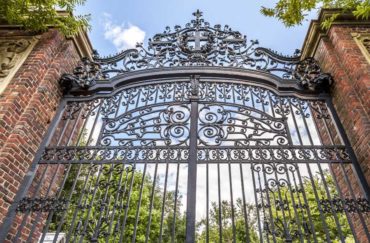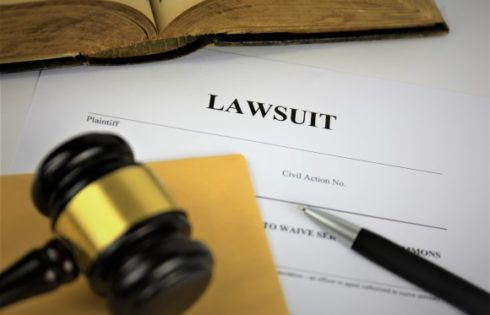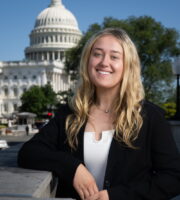
For second consecutive year, Harvard bottom ranked school with score of 0.00
The top five worst universities for free speech also all happen to be mostly Ivy League institutions, according to a major new student survey released today by the Foundation for Individual Rights and Expression.
Harvard, Columbia, New York University, the University of Pennsylvania and Barnard College made up the bottom five schools, respectively.
Conversely, the top rated school was the University of Virginia. Last year’s highest, Michigan Technological University, came in second best for free speech. In third place was Florida State University, and fourth and fifth were Eastern Kentucky University and Georgia Tech.
The Foundation for Individual Rights and Expression released its annual College Free Speech Rankings for 2024 on Thursday. The free speech climate of 257 of America’s universities was assessed by 58,807 students who responded to a College Pulse online survey from Jan. 25 through June 17.
Students rated their schools on a scale of 1 to 100 on six different criteria, with 100 being a perfect score. They were polled on their comfort expressing ideas, tolerance for controversial liberal and conservative speakers, administrative support for free speech, self-censorship and other topics.
The survey “took into account the varied dimensions of free expression on campus — from the ability to discuss challenging topics like the ongoing Israel-Hamas war, abortion, and race, to tolerance for controversial campus speakers and whether students hold back from openly sharing their views,” said Katie Kortepeter, a spokeswoman for FIRE, in an email to The College Fix.
For the second consecutive year, Harvard was the bottom ranked school with a score of 0.00.
Columbia also received a score of 0.00 this year. NYU received a 3.33, Penn had a score of 12.50, and Barnard College came in at 15.62. The speech climate of the bottom five schools was listed as either “abysmal” or “very poor,” according to the poll results.
Conversely, the top rated school was the University of Virginia with a score of 73.41. Last year’s highest, Michigan Technological University, is a close second at 73.15.
In third place is Florida State University with a score of 72.46. The fourth and fifth are Eastern Kentucky University with 69.60 and Georgia Institute of Technology with 69.39.
All top five schools had either “good” or “above average” speech climates, and students reflected that these schools defended free speech during controversies. These were all public state universities.
The survey summary notes that UVA, Michigan Tech, FSU, North Carolina State University, Oregon State University, Mississippi State University, Auburn University, George Mason University, Kansas State University, the University of Mississippi, the University of Chicago, and Claremont McKenna College have received high rankings consistently since 2020.
One key difference in the best and worst ranked schools is administrative support, according to FIRE, which noted in its report on the results that the outcome suggests “students who attend these schools do not think their administration strongly supports freedom of speech.”
FIRE’s Chief Research Advisor Sean Stevens said the free speech difference in state and private institutions is based on several factors.
“If you’re not a progressive on most of the small liberal arts campuses we survey, you may be one of the handful of conservatives or moderates there,” Stevens said in an interview with The College Fix. “There’s not too many people for you to discuss your views with where they’re not needing to strongly disagree with you.”
On a positive note, this year’s results found student concerns about self-censorship declined slightly, with only 17 percent responding they cannot share their feelings on a topic because of how classmates or faculty would respond. The statistic was 20 percent last year and 22 percent in 2022.
However, conservative students reported self-censoring more than their liberal or moderate peers: 34 percent of very conservative students reported self-censoring “very” or “fairly” often compared to 15 percent of very liberal students.
Stevens said the difference is because conservatives are often in the minority on their campuses, so their opinion is more likely to be controversial.
However, liberal students reported self-censoring on the Israel-Palestinian conflict more than conservative students. Over 60 percent of very liberal students reported the conflict as “very difficult” to discuss compared to about 50 percent of very conservative students.
“After the encampments, we have started to see a number of liberal students say they are self-censoring with more frequency and that they are concerned about the security of speech rights on campus now,” Stevens said.
Overall, the conflict was rated the most difficult to discuss, among other topics such as abortion, transgender rights, racial inequality, gun control and others. Stevens said around 20 campuses had 75 percent or more of students identifying the conflict as difficult to discuss.
“Some of the numbers this year just blew away anything we have ever seen before,” Stevens said, adding responses to the Israel-Palestinian conflict were the reason for many of the low scores for Columbia, Barnard and the University of South Carolina.
A companion report by FIRE focused on the 2024 student encampments found “‘Administrative Support’ — a measure of how strongly students think their administration supports free speech on campus — is significantly lower among students on campuses where encampment protesters were arrested than among students on campuses with an encampment but no arrests and among students on campuses without an encampment.”
Before the encampments, 85 percent of students responded that it was at least “somewhat” clear their administration protected free speech. After the encampments, about half of the students responded the same.
Stevens said a good outcome of the encampments was that more liberal students became aware of the lack of free speech rights. It has created an opportunity for free speech advocates to make progress on majority liberal campuses, he said.
FIRE is dedicated to preserving free speech and thought for all Americans, and believes college and universities play a vital role in this.
Stevens said while the top five schools do some things well, there is still room for improvement across the board since the highest-scoring schools only scored in the 70s.
The complete list of results is found at ranking.thefire.org, which includes how schools can be compared to each other and each school’s student responses.
Stevens said FIRE is worried about self-censoring on campuses because college classrooms are designed to be the ideal places to discuss controversial topics. Classrooms should come with a professor who can act as a moderator, helping students to properly evaluate the argument on the other side, he said.
Stevens said college must be a place to have hard conversations because it prepares students to respectfully engage in these discussions throughout their careers and adult lives.
“In a conversation that you are having in a local cafe or bar with a stranger, there’s no one moderating the conversation,” Stevens said. “In college, you’re already in an environment where it is better set-up to have these challenging conversations and not have them go off the rails.”
MORE: Here are the top 10 worst colleges for free speech, according to civil liberties group
IMAGE: Harvard University
Like The College Fix on Facebook / Follow us on Twitter






Please join the conversation about our stories on Facebook, Twitter, Instagram, Reddit, MeWe, Rumble, Gab, Minds and Gettr.